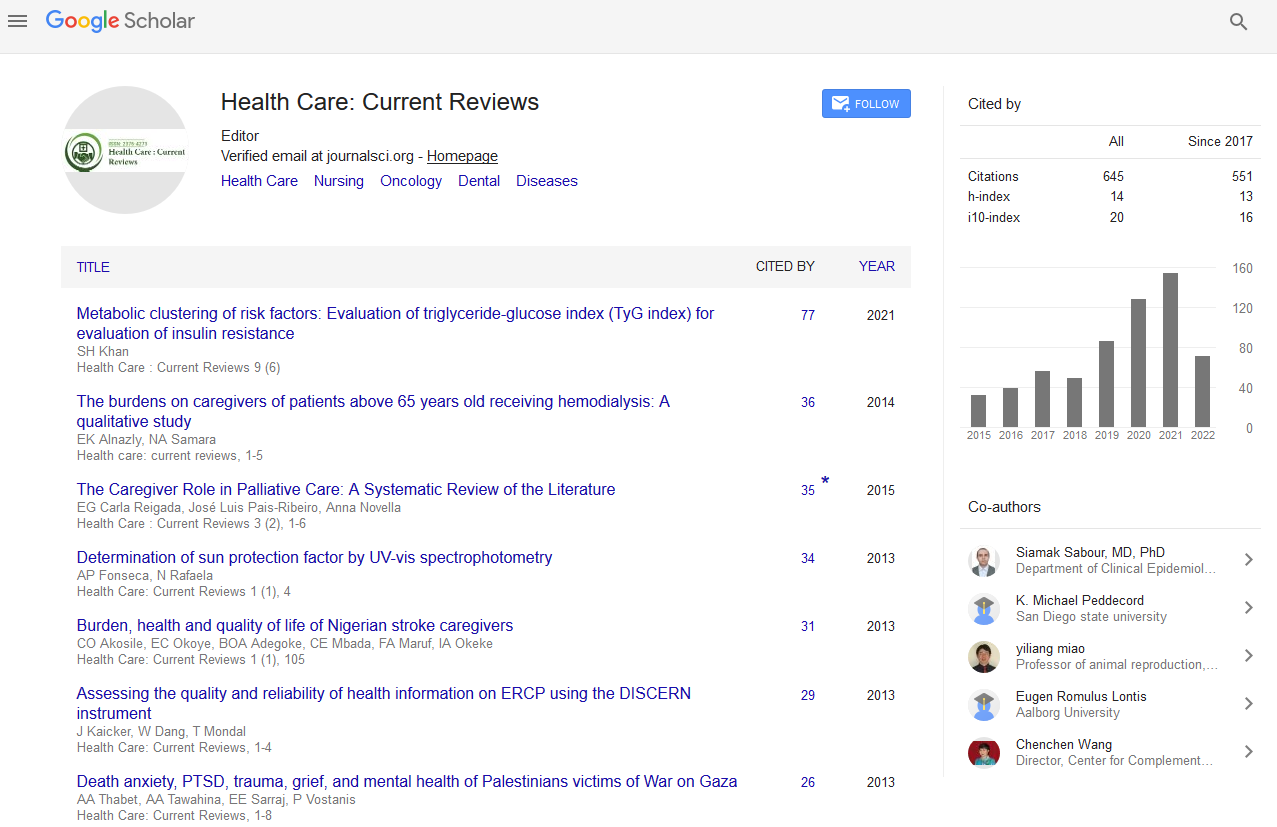PMC/PubMed Indexed Articles
Indexed In
- Open J Gate
- Academic Keys
- RefSeek
- Hamdard University
- EBSCO A-Z
- Publons
- Geneva Foundation for Medical Education and Research
- Google Scholar
Useful Links
Share This Page
Journal Flyer

Open Access Journals
- Agri and Aquaculture
- Biochemistry
- Bioinformatics & Systems Biology
- Business & Management
- Chemistry
- Clinical Sciences
- Engineering
- Food & Nutrition
- General Science
- Genetics & Molecular Biology
- Immunology & Microbiology
- Medical Sciences
- Neuroscience & Psychology
- Nursing & Health Care
- Pharmaceutical Sciences
THE EFFECTS OF PHILOSOPHIZING ON NURSES ASSERTIVENESS
7th World Congress on Healthcare & Technologies
September 26-27, 2016 London, UK
Fatemeh Khoshnavay Fomani, Mohammad Ali Cheraghi, Abbas Ebadi and Yahya Ghaedi
Tehran University of Medical Sciences, Iran
Baqiyatallah University of Medical Sciences, Iran
kharazmi University, Iran
Posters & Accepted Abstracts: Health Care: Current Reviews
Abstract:
Assertive nurses are capable to build effective team relationships, to manage workplace stress, gaining self-confidence, and to earn respect from others while respecting them. Thinking skills training is the fundamental component of promoting assertiveness programs. This approach leads us to investigate the effectiveness of philosophizing as the manifest of thinking skills, on promoting assertiveness skill. The aim of this presentation is to explore the effects of philosophizing through the philosophy for children (P4C) program on promoting nurses assertiveness skill. Although P4C has been introduced to promote children´s thinking skills, but according to our experiences, it is useful for the adult population by some modification of the content. In this study 50 nurses randomly allocated to �??P4C training�?� and �??control�?� groups. 12 sessions of P4C training were conducted for 25 members of the intervention group in three months. Using Rathus Assertiveness Scale, nurses´ assertiveness skill was evaluated in two groups, before and after implementing P4C program. T test and descriptive statistics using SPSS18 program applied to data analysis. The results indicated that the assertiveness was significantly improved in the intervention group. P4C program increases the inter-relationship skills and enhances cognitive, reasoning, emotional and social development of individuals. The participants of P4C program learn dialectic conversation and respecting different ideas and values. Development of ethical understanding in the context of philosophizing is the other advantage of P4C. Considering the P4C attributes, increasing assertiveness skill in the intervention group is justifiable. Although applying P4C was effected to increase assertiveness among the study participants, further investigations are needed to approve P4C usefulness in other nursing settings.
Biography :
Fatemeh Khoshnavay Fomani is RN, Ph.D. candidate from Tehran University of Medical Sciences, School of Nursing and Midwifery, with the specialties including Pediatric Nursing, and Philosophy for children from the Kharazmi University. The subject of her doctoral dissertation is philosophizing and resilience among adolescents laborer. She is interested in “philosophy for children”, “child maltreatment” and “resilience” research. Presently she is working at the Tehran University of Medical Sciences, Iran.
Email: F-khoshnava@razi.tums.ac.ir


